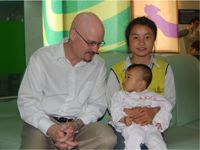Improving global health one program, one smile at a time
Posted: January 28, 2011
As a volunteer with Operation Smile, which he has been involved with for seven years, Tom DiDonna, D.H.Sc., ’10, travels into developing countries prior to surgical missions to provide life-saving training in pediatric and adult advanced resuscitation certification courses. DiDonna takes time out of his hectic schedule to share his story and passion with ATSU.
How did you hear about Operation Smile? What triggered your involvement?
Tom DiDonna (TD): I heard about Operation Smile from volunteers who were affiliated with the organization as I was making inquiries regarding volunteering for a foundation of some kind.
I grew up in a poor section of Rensselear, N.Y., and I believe the environment that I grew up in has provided me with life experiences that promote compassion for those who are poor and afflicted with the burdens of inequities in health. This is why my passion for the poor has directed me toward medical mission work and to pursue my advanced degree in health sciences with a focus on global health. There are so many needs in our world, and I believe my formal education at A.T. Still University, my profession as a nurse, the support of my family, my experiences growing up, and my passion for volunteerism all are critical ingredients to the work I do now.
What is your involvement in the organization?
TD: I provide training for physicians and some nurses in advanced life support to prepare them to handle post-operative complications and life-threatening events. Many of the infants and children with cleft palates are poor, malnourished, and suffer from aspiration syndromes and failure to thrive, and many are not be able to articulate properly. These patients are at a particular risk of airway complications post-operatively, and the training I provide offers clinicians advanced skills to appropriately intervene.
What is involved in the training?
TD: The Pediatric Assessment Course (P.A.C.) is a two-day class offered to nurses globally who wish to volunteer for Operation Smile to care for the infants and children receiving surgery during missions. I developed the curriculum for this course as part of my applied research project through ATSU. The main objective was to improve the pediatric assessment skills of nurses specifically related to infants and children in the immediate post-operative period. I created a pre- and post-design study educational intervention to determine if there would be a measureable and significant improvement in the skills of the nurses as a consequence of the two-day course.
What has been your biggest accomplishment with this course?
TD: I trained 48 nurses in Guwahati, which is in the Assam Province of North East India. All 48 nurses would then go on to volunteer for the largest single hospital site surgical mission in Operation Smile’s 25-year history. There were almost 1,000 surgeries, and there were no deaths! This was the ultimate outcome! I am now in the process of formulating a train the-trainer course for nurses globally so all nurses from all of the countries Operation Smile serves will have an opportunity to receive this very important learning opportunity.
What does P.A.C. mean to you?
TD: The P.A.C. is of particular importance as nurses in many poor developing countries have little to no opportunity to obtain continuing education and learning opportunities. These nurses are eager to volunteer to serve high-risk patient populations such as the infants and children we serve, but many do not have the skill set to do so. The P.A.C offers them that opportunity to learn life-saving assessment and intervention skills that they can utilize in all aspects of their nursing profession. I am a registered nurse, and I believe it is important that mentoring, educating, and collaborating are the keys to professional success and the utmost of patient safety.
What drew you to ATSU, and how has the university affected your volunteering?
TD: I chose ATSU as I am very interested in gaining added knowledge of the emerging specialty of global health. My volunteer work with Operation Smile and the American Heart Association has been enhanced as a consequence of the knowledge I gained from the Global Health program Helen Ewing, R.N., D.H.Sc., offers.
As a registered nurse, additional knowledge acquired by my coursework at ATSU has provided me a framework and basis to move forward in the areas of patient safety and nursing leadership, and a confidence level that prompts me to be more openminded to team learning, team doing, and team caring. I have discovered over the past two years while attending ATSU and accomplishing my first health improvement research project that I made the right choice, and I am grateful.
What are you currently working on now?
TD: I am actually working with three other wonderful individuals in formulating a 501c, NGO with the name ‘Health Share Partners’ and the vision statement “Improving the health of humanity one training program at a time.” We are making a commitment to build on partnership/team learning, and our initial focus will be basic trauma training in Africa.
Where do you see yourself in five years?
TD: I would love to be teaching global health at the doctoral level, be deeply involved in the foundation I am currently working on, and enjoying life.
How would you like to be remembered?
TD: As a simple and humble man who did the best he could to be a good husband, father, brother, friend, and human being.